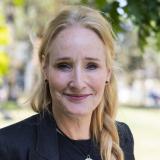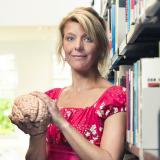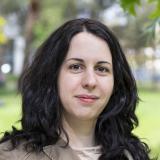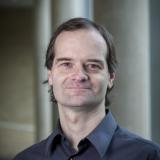The Zero Poverty Lab team
Brains, people, the world and how they connect and influence each other is what concerns the researchers at Zero Poverty Lab.
If you know how big the impact is of the circumstances in which you grow up on the development of our brain, our behavior, and society, then you understand that solving poverty is important for all of us, and we can all contribute to the solution.
Margriet Sitskoorn
-

Margriet Sitskoorn
Professor of Clinical NeuropsychologyMargriet Sitskoorn is Professor of Clinical Neuropsychology, Head of Department of Cognitive Neuropsychology at the Tilburg School of Social and Behavioral sciences and Director of the Zero Poverty Lab. She researches the relationship between the brain and our behavior. In particular, she looks at the influence of the environment and our behavior on the brain. She uses the scientific insights this provides to fight poverty, among other things. Margriet is highly motivated to disseminate knowledge and tools to a large audience and to enhance the quality of people's lives and society. To achieve this, in addition to her academic work, she appears regularly in radio and TV programs, publishes books, and writes for various media.
-

Wouter de Baene
Associate Professor of Cognitive NeuropsychologyWouter De Baene is a psychologist and neuroscientist. He started studying the brains of monkeys during his PhD research at K.U. Leuven. He then focused on the study of human brains using fMRI at Ghent University. In his current position as associate professor in the Department of Cognitive Neuropsychology at Tilburg University, he studies the relationship between brain structure, brain function, and human behavior and cognition both in healthy and in ill people. He investigates how internal factors such as brain lesions (e.g., brain tumors) and external factors (e.g., poverty) affect this relationship.
-

Marion I. van den Heuvel
Associate Professor of Developmental NeuropsychologyMarion I. van den Heuvel is an associate professor. She conducted her PhD research on the effects of maternal mental health during pregnancy on neurocognitive functioning in infants and young children. She continued her career courtesy of a prestigious postdoctoral fellowship from Wayne State University at the Perinatology Research Branch of NICHD/NIH in the United States. During her post-doctoral research, she continued her research in the field of developmental neuroscience and expanded her knowledge of fetal fMRI. In her current work, she studies how early life influences can guide brain development from the very beginning. At the Zero Poverty Lab, she investigates the mechanisms of intergenerational poverty. She focuses on the effect of poverty and poverty-related adversity on the developing brain in the first 1,000 days.
"My ambition through my research and efforts at the Zero Poverty Lab is to contribute to a good, healthy start for all children. In order to achieve this, I don't stay behind my desk, but enjoy going out and talking to and on behalf of professionals and parents about my research and helping where I can."
-

Karin Gehring
Researcher NeuropsychologyKarin Gehring is a neuropsychologist and researcher. Among other things, she studies the cognitive functioning of people with and without brain disorders over time with repeated neuropsychological measurements. An important goal in this respect is to be able to make predictions about cognitive functioning over time. She also dedicates herself to the Zero Poverty Lab with her expertise in intervention studies, such as cognitive rehabilitation and physical training after a brain disorder.
"I find it enormously important that my research results can always directly mean something to people in daily or clinical practice."
-

Nadya Ali
PhD candidateNadya Ali is a PhD candidate at the Zero Poverty Lab. She investigates the interaction between genes and the environment at different stages of brain development. She previously conducted research on the effects of prenatal maternal anxiety on children's cognitive development. She also did so on the role of DNA methylation, an epigenetic regulatory mechanism, in the treatment of major depressive disorders. She is currently studying early life influences and gene-x environment interactions in brain development, from preconception to the postnatal period. Within the Zero Poverty Lab, she is unraveling the mechanisms underlying intergenerational poverty and aims to identify possible intervention targets.
"Being a part of the Zero Poverty Lab team has been an inspiring experience that allows me not only to pursue my goals as a researcher but, more importantly, to work towards improving the lives of others. My dream is that someday all children will be born into and grow up in an environment that enables them to pursue their own dreams.”
-

Freek van der Heijden
PhD candidateFreek van der Heijden is a PhD candidate at the Zero Poverty Lab. He uses MRI data to study the complex relationship between poverty and specific brain networks. His passion lies in understanding how both external and internal factors influence our brains and thus shape our behavior. What attracts him to the Zero Poverty Lab is the power of collaboration between different Schools, bringing together diverse expertise and knowledge to achieve a particularly relevant social goal: breaking the cycle of generational poverty.
"My ambition is to gain in-depth knowledge of the neurophysiological effects of poverty in order to lay the foundation for innovative interventions that can effectively combat poverty."
-

Pavel Cizek
Associate Professor of Econometrics and Operations ResearchPavel Cizek is an associate professor in the Department of Econometrics and Operations Research. He focuses on the development of econometric and statistical methods and tools for the analysis of microeconomic data. This includes, for example, data which describe individuals' income, poverty status, or education or employment decisions, as well as their dependence on family structure, education, health, and other socioeconomic characteristics. The methods developed are often designed to be based on fairly minimal assumptions about individuals' behavior and to be robust against errors in the data. As of this year, he has also been working on finding and developing econometric methods suitable for data analysis conducted by both the Zero Hunger Lab and the Zero Poverty Lab, and particularly methods for analyzing the impact of hunger and poverty on brain development.
"As increasing amounts of more detailed data and information about individuals are collected, I want to contribute to their analysis, which answers important questions about the well-being and good and healthy lives of individuals and the policies that help achieve this."
-
Franka Schellekens
PhD candidateFranka Schellekens is a PhD candidate at the Zero Hunger Lab and, together with her colleagues from the Zero Poverty Lab, is researching the effect of (under)nutrition and poverty on brain development. While doing so, they are developing new statistical methodologies. Previously, Franka earned a Master's degree in Business Analytics and Operations Research and a Research Master's degree in Operations Research. After her studies, she worked at Rhythm, a consulting firm specializing in Integrated Capacity Management in healthcare, for two years.
"For me, the challenge in my research is to create innovative statistical methodologies and deploy them in a practical way so that we can actually contribute to breaking the cycle of poverty."
-

Paul van Geest
Professor at Tilburg School for Catholic TheologyPaul van Geest is Professor of Church History and History of Theology at the Tilburg School for Catholic Theology and Professor of Economics and Theology at Erasmus University Rotterdam. Among other positions, he is a member of the Pontifical Academy of Theology in Rome. He examines the interaction of the market, morality, and human images that underlie morality and the vision of the functioning of the market. In addition, he writes about the magisterium of the Catholic Church's view of poverty and poverty alleviation. He uses the scientific insights this provides to establish the stratification of the concept of poverty and thus raises awareness that poverty has had many facets for millennia, all of which must be combated. To bring his insights to a wider audience, in addition to his scholarly work, he can be heard regularly on the radio and on TV and writes for various popular magazines and newspapers.
"The too poor and the too rich have one thing in common, says Augustine. They are governed by fear. The first by the fear of having too little to give loved ones a good life. The second by the fear of losing possession. So the rich become free of their fear when they become generous. The solution to the poverty problem lies in the generosity of the haves. Their path to happiness, for that matter, too."
-

Lukas Chanan Jansen
PhD candidateLukas Chanan Jansen is a PhD candidate at the Zero Poverty Lab. Under the guidance of Paul van Geest, he contributes to poverty research from a theological perspective. After studying Theology and Philosophy at VU University Amsterdam and a Master's degree in Theology and Educational Sciences at Radboud University, Lukas feels called to complete this PhD research. His experience providing humanitarian aid in Armenia adds an extra dimension to his contribution to this research, for which he can combine his academic passion with having an impact on addressing poverty.
"At a time when we are learning to interact with artificial intelligence and pursue goals of social justice, it becomes all the more urgent to learn from the humanities to reflect on how the human mind evolves. Within this context, I hope to contribute to the study of poverty and human psychological development, supported by the recent developments of AI and the connection of different sciences."
-

Çiçek Güven
Assistant Professor of Cognitive Science and Artificial IntelligenceDr. Çiçek Güven works as an assistant professor at Tilburg University, specializing in cognitive science and artificial intelligence. Her main research areas concern understanding networks, which are systems in which the components are interconnected. She is also involved in analyzing data similar to interconnected graphs. She is particularly interested in using data science to work on projects with a social impact. For example, she is part of Zero Hunger Lab's Child Growth Monitor project, which uses artificial intelligence to detect malnutrition in children. Another comprehensive project she is involved in, called "Ilustre," focuses on support efforts to switch to cleaner energy sources in the Caribbean and Latin America. Looking ahead, she wants to do research on how the networks in our brains are related to poverty. She also wants to create new ways to explain how AI and data analysis work, especially when it comes to data that look like interconnected graphs.
"Research at the intersection of Graph Neural Networks and brain data aims to address the most pressing challenge of our world: poverty."
-

Valentina Sánchez Melchor
PhD candidateValentina Sánchez Melchor's research operates at the intersection between machine learning, cognitive science, and poverty studies. Her project uses graph models to investigate the impact of poverty on brain structure, function, and cognition. One of her main goals is to introduce innovative statistical methodologies for analyzing complex brain networks. A key objective is to identify and quantify factors that negatively affect brain development.
Based on her Master's thesis in Graph Neural Networks, she is expanding her research into the field of explainable AI. Valentina is committed to making AI predictions more transparent and accessible. In her quest, a sharp focus on ethical considerations remains paramount to ensure unbiased and equitable AI applications.
“By unravelling the intricacies of neural networks and the impacts of poverty, we pave the way towards a deeper understanding of society's imprints on the mind. Guided by ethics, we aspire for AI to help illuminate every facet of the human condition.”
-

Hein Fleuren
Professor of Business Administration and Operations ResearchHein Fleuren is Professor of Business Analytics and Operations Research (BA/OR) at Tilburg University and co-founder and director of the Zero Hunger Lab. His research interest is the application of data science techniques to make this world a better place, especially where hunger and poverty are concerned.
Hein's main specialization is modeling transportation & distribution. Major organizations he has worked for include Philips Electronics, Deutsche Post AG, TNT Express, DPD and World Food Programme. In 2012, Hein was part of the winning TNT Express team of the prestigious Franz Edelman award in Los Angeles, together with Tilburg University. In 2018, Hein and his PhD candidate Koen Peters won the DCHI Award for Humanitarian Innovation. And in 2021, he was again part of the winning team of the Franz Edelman award with the World Food Programme. He is an engaged sparring partner for the Zero Poverty Lab team in developing impactful research.
"Data science can help tremendously in making very complex problems like poverty and hunger much more understandable."
-

Elise de Neubourg
Project Manager Zero Poverty LabElise De Neubourg is a project manager at the Zero Poverty Lab. She studied developmental psychology, for her PhD she conducted research on the relationship between executive functions, school outcomes, and socioeconomic background among elementary school students. At the same time, she has years of experience doing policy research on child poverty and social welfare worldwide. As project manager, Elise is responsible for the coordination and daily operations of the Zero Poverty Lab. Furthermore, she is the linking pin between the different researchers and organizations connected to the Lab. Elise's ambition in the coming years is to build the Zero Poverty Lab into an impactful place where research and society come closer together.
"Poverty is so much more than not having enough money. It is a complex problem that spans generations and affects all areas of people's well-being. I would like to make the Zero Poverty Lab successful in identifying the issues, possible solutions, and in doing so, make a tangible contribution to improving people's lives."
-

Marjolein Neleman
Junior ResearcherMarjolein Neleman works as a junior researcher for Sterkste Schakel, a project in which Zero Poverty Lab collaborates with the municipality of Waalwijk. This project supports families in financial stress and researches economic self-sufficiency over time among families. Through qualitative data collection, Marjolein identifies family members' well-being, executive functioning, financial stress and other relevant factors.
She studied Psychology and finished two Masters in Cognitive Neuropsychology and Data Science at Tilburg University. Fascinated by the workings of the mind since her undergraduate years, Marjolein is especially interested in studying how the brain shapes behavior.
"What I love about my work is that I can visit families and really get to know them. I realize every time how hard it is to let go of the financial stress when you are faced with this every day. On the other hand, it’s very beautiful to see families grow over time; from chaos in the head to rest."

